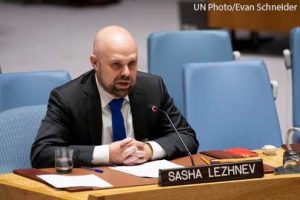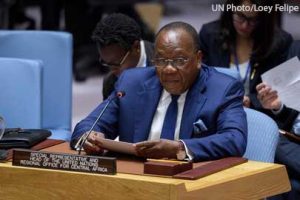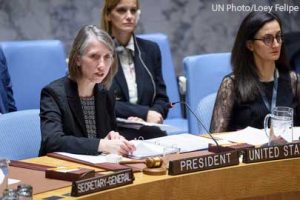
Blog / / 12.10.19
Enough’s Sasha Lezhnev Briefs UN Security Council on Central Africa: Preventing Conflict by Focusing on Financial Issues
On December 6, Enough Project Deputy Director of Policy Sasha Lezhnev briefed the United Nations Security Council on conflict prevention in Central Africa, emphasizing the need for the Council and the United Nations Regional Office for Central Africa (UNOCA) to focus strategically on the financial aspect of crises in the region.
Read the highlights from the briefing or watch the video below.
Challenges
- Conflict resources and money laundering
Rebel groups, criminal units within armies, and their facilitators generate hundreds of millions of dollars each year from trading in conflict resources such as gold, diamonds, and other minerals. These are a critical driver of conflict in the region, as armed commanders and their backers want to continue making money and thus break peace agreements for the continuation of such interests. The key to combating these interests is to follow and target the networks that control the trade across borders. It is most impactful to target the middlemen, financial facilitators, and corrupt officials that enable the trade in conflict commodities.
- Preventing mass violence and improving transparency
Many presidents in the region have been in power longer than the average age of the population, some as long as 40 years. Citizens are growing impatient with non-democratic regimes. This dichotomy is creating serious stability risks. Five countries in the region are rated by the U.S. Holocaust Museum to be in the highest risk category for mass killings. Arguably the biggest factor in preventing the reform processes is money. In order to protect illicit financial interests, regimes entrench themselves and repress populations. The best way to prevent these countries from falling into instability is to help get them to reform. Youth and civil society from the DRC to Cameroon to Gabon are tired of corruption and are demanding that the governments enact transparency and anti-corruption measures.
Solutions
- Engage the banking and gold sectors
The Security Council and UNOCA should proactively engage banks on sanctions implementation and anti-money laundering. The Wolfsberg Group, an association of 13 global banks, might be a good place to start. The Council could convene a session with the Group on sanctions implementation and anti-money laundering and countering the financing of terrorism (AML/CFT), and then set up an ongoing working group. UNOCA should also meet regularly with banks in the region to follow up on sanctions implementation.
Similarly, the Council should engage the global gold sector on conflict gold. Specifically, the Council should work with the Financial Action Task Force (FATF) and convene key gold refiners, traders, and banks to highlight the need for better implementation of the red flags in the 2015 FATF typology report on gold, money laundering, and terrorist financing risks.
- Engage anti-money laundering bodies and financial authorities
FATF and regional FATF bodies can play critical roles in combating conflict finance, and the Council and UNOCA should engage them as part of their conflict prevention efforts. The Council should make supporting regional AML efforts a part of UNOCA’s mandate, in order to stem the flows of illicit and conflict financing. Specifically, UNOCA should coordinate with Groupe d’Action contre le blanchiment d’Argent en Afrique Centrale (GABAC) and key financial intelligence units in the region and then raise GABAC-related issues in its dialogues with governments in the region. UNOCA should also work with GABAC, FATF, and the World Bank to ensure mutual evaluations and risk assessments are conducted in a timely, effective, and apolitical manner.
- Sanction networks, not just individuals
Rebel leaders breaking peace accords have companies, as well as traffickers, facilitators, and family members who collaborate with them, each profiting from the spoils of war. To be effective, sanctions should target these networks that spoil peace processes. In this vein, the Council should empower Panels or Groups of Experts with the mandate to investigate the networks that facilitate illegal spoilers. They should also support them with an additional expert on regional facilitators.
- Work with key partners to help governments enact transparency reforms
Key international partners such as the International Monetary Fund (IMF), the Extractive Industries Transparency Initiative (EITI), and civil society coalitions are working with governments on transparency reforms, and the UN should coordinate with them. UNOCA should meet regularly with EITI multi-stakeholder groups, IMF teams, and civil society coalitions to find out what transparency reforms are the priorities. Then the SRSG can reference these reform calls when meeting with governments in the region. The Security Council should include reporting on financial transparency and governance reforms in the mandate of the mission. This would be an important conflict prevention tool, as it would inform the heads of state that there are some key reasonable steps that citizens and international partners are demanding. They could thus take those steps to prevent much wider crises with disastrous human impacts.
The full testimony is available here.


